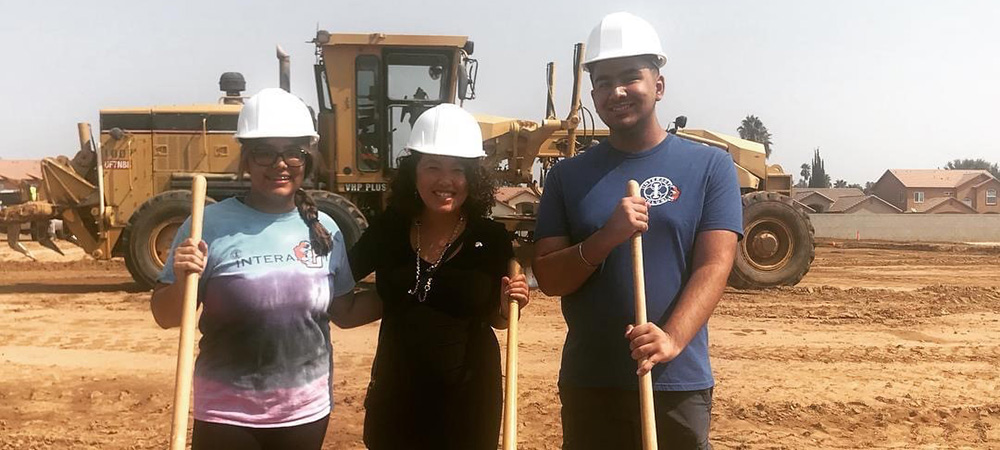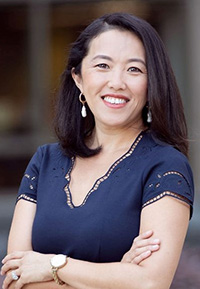
(Photo courtesy of Geri-Yang Johnson)
California Forward is committed to advancing policy intersections that create a more inclusive and sustainable California where all people can prosper. To move this forward, we must reimagine a state where we address the racial and geographic inequities that have been exacerbated by a public health and economic crisis, and we must answer the call to dismantle structural racism. The Voices of Shared Prosperity series amplifies the stories of Californians who are committing their time and talent to solutions that embrace equity, environmental sustainability, and economic opportunity.
“Who is the community? That is the question we should always be asking – and challenge yourself to go outside of that.” This is the reflection of Geri Yang-Johnson, vice president and senior consultant for Wells Fargo, as she reflected on the role of institutions and power structures in approaching authentic community engagement.
 In the wake of the COVID-19 pandemic, racial violence and protests, the emphasis on an equitable recovery has been at the forefront of nearly every economic and community development discussion. Regions and businesses throughout the state are being faced with putting those sentiments into action. Yang-Johnson is responsible for implementing Wells Fargo’s community and economic development programs in Central California.
In the wake of the COVID-19 pandemic, racial violence and protests, the emphasis on an equitable recovery has been at the forefront of nearly every economic and community development discussion. Regions and businesses throughout the state are being faced with putting those sentiments into action. Yang-Johnson is responsible for implementing Wells Fargo’s community and economic development programs in Central California.
She is deeply rooted and invested in the success of the Central Valley. Before her role with Wells Fargo, Yang-Johnson served as a program officer for the Central Valley Community Foundation. In 2018, she founded the Mala Scholarship Fund with the Central California Asian Pacific Women to help support first-generation AAPI students pursuing higher education.
She celebrates her alma mater, Fresno State, as one of the region’s many resources and credits it with helping her explore community intersectionality and economic development. A recent recipient of the College of Social Sciences’ Top Dog Outstanding Alumni Award, Yang-Johnson serves as an Executive Committee member and Racial Equity Committee member for the Fresno D.R.I.V.E Initiative. She has been a collaborative leader in developing the D.R.I.V.E Theory of Change and facilitating discussions supporting a shared understanding of historical narratives.
“One of the things we have to do in this work, to build community and economic development, is start talking about the many contributions and ways in which our rich and diverse communities have contributed so far and will continue to contribute going forward,” she added.
While Yang-Johnson credits her formal education at Fresno State with significant parts of her development, it was her years working with her family in the fields and observing other families work in partnership to grow and manage seasonal crops that laid the foundation for her perspectives on community interconnectivity. She worked with her siblings, growing and picking strawberries, chili peppers, and lemongrass. While she recognized the rewards of her family’s work, she shared that it was backbreaking labor that didn’t always meet financial needs.
| 28% of all of the Asian American producers in the United States live and farm in California. (Source: USDA) |
|---|
Yang-Johnson is the proud daughter of immigrant parents. Her parents were refugees fleeing war when they came to the states. “Culturally it has been embedded in me that we move together as a family and as a community. We have to all move together or none of us move forward,” she said.
Yang-Johnson is vocal about her support for community narratives and contributions saying “[AAPI communities] are speaking up now at this time and in this moment because we’ve long been erased and silenced from history.” In response to the killing of six Asian women who were murdered in Atlanta earlier this year, Yang-Johnson published an op-ed about her experience as a Hmong woman and the necessary urgency for radical change to support and protect AAPI communities. She champions the importance of shared learning and education about the contributions of people of color throughout history including the unrecognized contributions of Filipinos in the farm worker movement as well as influential Hmong communities in the Midwest and California and countless other marginalized communities.
Yang-Johnson provided some steps that institutions can take to start building authentic relationships with communities including:
- Addressing Racial Equity at Every Level of Development – Yang-Johnson insists institutions must look at the impact of racial inequity at the organizational and structural level as a prerequisite to all forms of economic development work. She points to the disproportionate impact of the COVID-19 pandemic on Latinx, Black and Native communities as the results of a “long history of not addressing the root causes and implications of racial inequity, and developing solutions that benefit everyone.”
- Placing Community at the Core of Economic Development – “You can’t grow your economy – you can’t do economic development work if you are not committed to community development.” She expressed that quality healthcare, strong educational attainment, and livable wage jobs are possible in the Central Valley but strong community influence must be built into the solutions.
- Opening Spaces for New Voices – Yang-Johnson identified the people and the diverse experiences of the Central Valley region to be among its top assets. “The people of the Central Valley are incredibly resilient. We work with what we have and we make sure that we grow it.” Regarding solution building, she said “we have to build a table big enough for everyone to participate.”
Yang-Johnson insists “people with lived experience are the people who have the solutions.” She continues to strive for authentic community outreach that invites engagement and builds leadership and sustainability within the communities being served.

